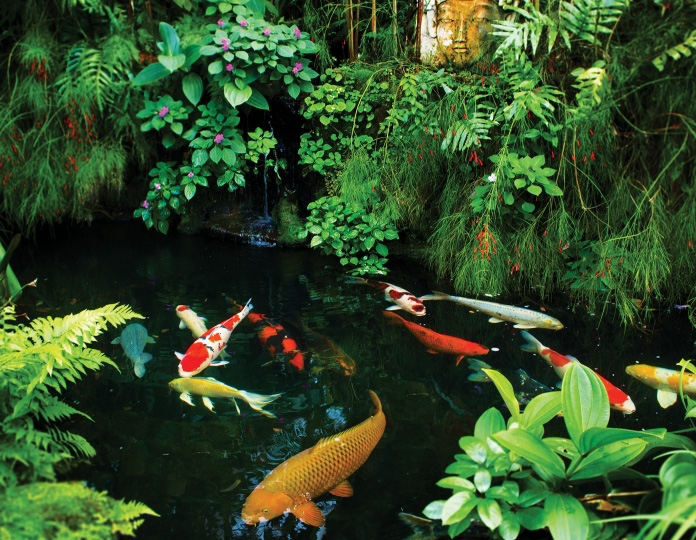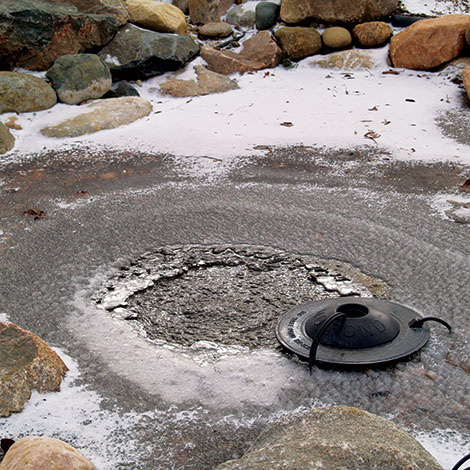PROPER POND MAINTENANCE
Maintaining your own pond can seem like a daunting task. Don't get overwhelmed because the steps to maintaining crystal clear waters throughout the season are simple. Ponds do require a bit more maintenance than other water features but the reward is well worth the investment. With a small amount of proactive prevention you can avoid many of the maintenance nightmare myths associated with backyard ponds.
GET OFF TO A GOOD START
 Every good pond season starts with a spring opening. "Openings" usually involve a full draining of the pond and a washing down of all the rocks and gravel within the pond. This dirty water is removed and the pond is filled with new clean water. All of the filtration is checked and media is also cleaned or replaced at this time. Starting the season this way ensures an ecosystem that is easy to balance.
Every good pond season starts with a spring opening. "Openings" usually involve a full draining of the pond and a washing down of all the rocks and gravel within the pond. This dirty water is removed and the pond is filled with new clean water. All of the filtration is checked and media is also cleaned or replaced at this time. Starting the season this way ensures an ecosystem that is easy to balance.
MAINTAINING CLEAR WATER
 Ecosystem ponds don't rely on complicated filtration systems to maintain clear waters. Instead they achieve this balance by having the right mix of organisms to create a proper ecosystem. Although having enough aquatic plants and not too many fish for the size of your pond are important rules to follow, the organism that really makes this ecosystem possible is invisible to the naked eye. Regular treatments of beneficial bacteria are the secret to keeping your pond crystal clear all year long. Dosing once a week as the season starts and once every two weeks during the summer keeps the population of beneficial bacteria high. As they settle on the rocks and gravel they establish colonies that constantly consume the waste that settles to the bottom of your pond. A biological filter working 24-7 to keep your pond as clean as can be.
Ecosystem ponds don't rely on complicated filtration systems to maintain clear waters. Instead they achieve this balance by having the right mix of organisms to create a proper ecosystem. Although having enough aquatic plants and not too many fish for the size of your pond are important rules to follow, the organism that really makes this ecosystem possible is invisible to the naked eye. Regular treatments of beneficial bacteria are the secret to keeping your pond crystal clear all year long. Dosing once a week as the season starts and once every two weeks during the summer keeps the population of beneficial bacteria high. As they settle on the rocks and gravel they establish colonies that constantly consume the waste that settles to the bottom of your pond. A biological filter working 24-7 to keep your pond as clean as can be.
FINISH STRONG
 After summer has come and gone and the temperatures start to drop, your pond may not seem as vibrant. From mid-September to early December is the fall season for ponds. At this point the leaves start to fall and plants may start to die back due to colder overnight temperatures. Some pond owners will choose to have the pond netted. Pond netting prevents leaves from landing in the pond and eventually rotting away on the pond bottom. Closing the pond properly will ensure a simple start up next spring. Cut back all aquatic plants to keep plants from contributing to organic waste within the pond. Placing a floating de-icer and diffusing air stone, attached to a small air pump, in your pond will help to keep a hole in the ice. Allowing the build up of gasses that are produced by decomposition to escape ensures the safety of your hibernating fish friends.
After summer has come and gone and the temperatures start to drop, your pond may not seem as vibrant. From mid-September to early December is the fall season for ponds. At this point the leaves start to fall and plants may start to die back due to colder overnight temperatures. Some pond owners will choose to have the pond netted. Pond netting prevents leaves from landing in the pond and eventually rotting away on the pond bottom. Closing the pond properly will ensure a simple start up next spring. Cut back all aquatic plants to keep plants from contributing to organic waste within the pond. Placing a floating de-icer and diffusing air stone, attached to a small air pump, in your pond will help to keep a hole in the ice. Allowing the build up of gasses that are produced by decomposition to escape ensures the safety of your hibernating fish friends.
